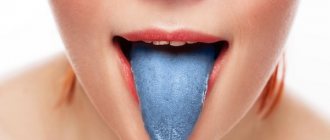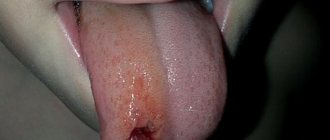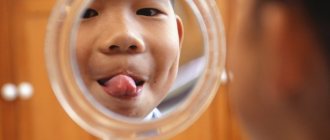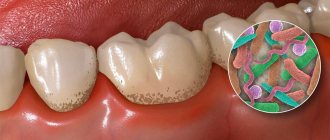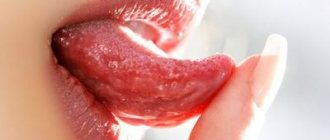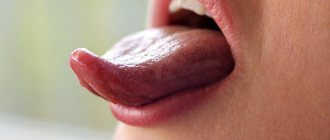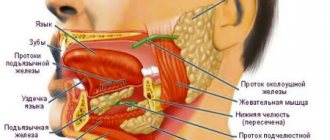Vincent's ulcerative necrotizing stomatitis
One of the reasons that the tongue hurts on the side is Vincent's ulcerative necrotizing stomatitis. With this disease, ulcers appear in the oral cavity, which can be located not only directly on the tongue, but also on the mucous membrane of the cheeks, and even spread further:
- on the gums;
- sky;
- tonsils.
The disease is caused by bacteria: spirochetes and fusobacteria. What is especially characteristic of this pathology is that the ulcers are covered with a dirty gray coating. Vincent's ulcerative-necrotizing stomatitis is treated locally with antimicrobial drugs. Broad-spectrum antibiotics are also prescribed.
What is “bad bite”
Bite (or occlusion) is the closing of the jaws at the moment of their natural compression. The standard is considered to be central occlusion, in which the number of points of contact between the teeth of the upper and lower jaws is maximum.
But all other options for interaction of the jaws when closing are malocclusions. Today it is customary to identify the main forms of malocclusion:
- open: there is no tight closure of the dentition
- cross: the antagonist teeth of the upper and lower jaws overlap each other with segments (in one area the lower ones overlap the upper ones, in the other - vice versa)
- mesial: the lower jaw protrudes forward, the upper teeth overlap the lower ones
- distal: the upper row of teeth is pushed forward, overlapping the lower one,
- deep: a type of distal bite when the upper jaw almost completely hides the lower teeth.
Contrary to the opinion of many people who believe that malocclusions are not a cause for concern, you should know: malocclusion of any form in most cases causes dental problems, and sometimes problems of a different nature.
The absence of several teeth and loose jaw closure can provoke:
- deterioration of the gastrointestinal tract;
- frequent headaches;
- development of facial asymmetry;
- premature appearance of facial wrinkles.
An incorrect primary bite can affect the growth of permanent teeth and lead to even greater deformation of the jaw system.
And very often, malocclusions cause permanent injury to the mucous membrane, including a strong bite of the tongue and the inner surface of the cheek. And the presence of open wounds in the oral cavity is a direct path to infection and the development of inflammation.
Don’t leave the problem unattended, contact your orthodontist on time!
Tongue injuries
Another reason why the tongue hurts on the side lies in mechanical injuries to the organ. They occur when eating food with sharp parts (seeds, nuts, undercooked cereals), hitting, or biting. Damage can occur due to a seizure, sports, falls, or various accidents.
If you are absolutely sure that the soreness is the result of an injury, then you just need to give the tongue time to recover. Nevertheless, examination by a specialist to clarify the diagnosis and treatment will not be superfluous.
Symptomatic features of pain under the tongue
Pain in the sublingual area can have various symptomatic manifestations. First of all, they are accompanied by different types of pain (sharp, aching, throbbing), as well as constancy or frequency.
If you consult a doctor, it is very important to correctly characterize the pain - this will allow the specialist to narrow down the range of symptoms for differential diagnosis. For example, you may have pain in the frenulum under your tongue or pain under your tongue on the right/left.
One of the characteristic manifestations of stomatitis or candidiasis is a white pimple under the tongue. Its presence may indicate the development of a fungal or bacterial process. If such a symptom is detected, treatment will include antifungal and antibacterial therapy with the prescription of antibiotics or special antiseptic rinses. The presence of pimples of a different color may indicate the presence of a wide range of problems, the identification of which requires a thorough diagnosis of the oral cavity or the entire body.
Glossitis
Glossitis
is an inflammation of the tissues of the tongue, manifested in its soreness, changes in color and structure, and the appearance of a dense coating. There is a burning sensation, hyperemia (overflow of blood vessels), food loses its taste, and salivation increases.
If the doctor has diagnosed the patient with glossitis, then the next step is to find out whether this indicates a pathology of other organs. This could be a herpes virus, poisoning with heavy metal salts, etc. Treatment is prescribed depending on the initiating cause, trying to exclude it. It usually includes local antiseptic therapy.
How to speed up wound healing
All wounds heal sooner or later - this is understandable, but the duration of healing largely depends on your actions. How to behave so that the injured mucous membrane heals as quickly as possible and without consequences? Some valuable tips for this case:
- pay increased attention to oral hygiene - this will help avoid infection of an open wound (regular brushing of teeth, careful removal of food debris and bacterial plaque);
- observe the temperature regime, avoid excessively hot or chilled foods for a while: cold is good only as an emergency measure, but subsequently it slows down the healing process; hot food and drinks both irritate and injure damaged tissues;
- use external antiseptics (sprays, ointments, lozenges): the pharmacist at the pharmacy will help you with the choice, ideally you should consult a doctor;
- rinse your mouth with decoctions of medicinal herbs: the best for these purposes are chamomile and St. John's wort;
- increase the proportion of foods with vitamins B and C in your diet, which promote wound healing; To heal scratches on the mucous membrane, use ascorbic acid.
Use the advice of traditional medicine with caution: rinsing with medicinal decoctions is not so harmless, you can resort to their help only with the permission of a doctor!
Catarrhal glossitis
If the tongue hurts on the side and a white coating covers its surface, then this is most likely catarrhal glossitis - a special case of this disease. It can be considered as a symptom of other pathologies. In particular, it is called:
- caries;
- stomatitis;
- gastrointestinal diseases;
- various infections (measles, diphtheria, etc.).
In addition to pain and plaque, symptoms of catarrhal glossitis include swelling of the tongue and a burning sensation, which is especially worse after eating or talking. The disease is treated by eliminating its causes and rinsing the mouth with antiseptic solutions.
Treatment
Pre-hospital assistance
It is recommended to avoid foods that are too hot, cold, hot or spicy. You should eat soft foods that do not injure the tongue, preferably stewed, boiled, steamed. The best option is a diet that includes purees, slimy porridges, pureed soups. Before and after meals, you need to rinse your mouth with weak solutions of chlorhexidine and potassium permanganate or a solution of furatsilin. For severe pain, the surface of the tongue can be lubricated with local anesthetics.
Conservative therapy
An important part of the treatment is the sanitation of the oral cavity, and, if necessary, the replacement of dentures and orthodontic structures. The list of therapeutic measures is determined by the nature of the pathology:
- Glossitis
. Rinses and applications with anesthetics are indicated. For intense pain, lubrication with a mixture of glycerin and anesthesin is effective. Plaque is removed with a swab containing proteolytic enzymes. Treat with antiseptics. Local healing drugs are used. - Phlegmon and tongue abscess
. For superficial abscesses, rinse with antiseptic solutions, prescribe antibacterial agents, and if ineffective, surgical interventions are performed. For deep abscesses and phlegmons, conservative therapy is an auxiliary treatment method, carried out against the background of operations, and includes antibiotics, analgesics, antihistamines, and anti-inflammatory drugs. - Candidiasis
. Alkalinizing rinsing solutions are used as local remedies. The oral cavity is lubricated with antifungal ointment and treated with solutions of iodinol, lugol, fucorcin. The therapeutic regimen also includes general antifungal drugs and, in severe cases, immunotherapy. - Glossalgia
. It is recommended to take light tranquilizers, motherwort, and valerian. A good result is achieved with trimecaine blockades of the lingual nerve and injections of B vitamins. Unpleasant sensations are eliminated through oral baths and applications with anesthetics. The main pathology and neurotic disorders are treated. - Xerostomia
. It is recommended to stop smoking and drinking alcohol, use soft-bristled toothbrushes, drink frequently to moisturize the mouth, and suck on sugar-free lollipops to stimulate saliva production. The oral cavity is lubricated with a solution of vitamin A. Novocaine blockade of the salivary glands is performed, vibration massage, medicinal electrophoresis, and galvanotherapy are prescribed. - Neuralgia
. Anticonvulsants, non-narcotic analgesics, and vitamin complexes are used. For severe pain, antidepressants, sleeping pills, sedatives, and antipsychotics are recommended. Therapeutic blockades are carried out. Lubricate the tongue with a solution of cocaine. Patients are given a referral for SMT, galvanization, and diadynamic therapy. - Anemia
. In case of iron deficiency anemia, treatment of the underlying disease, nutritious nutrition with a high content of heme iron, and ferrous preparations are required. In case of pernicious anemia, the provoking pathology is corrected and vitamin B12 is prescribed.
Inflammation of the salivary glands
This disease is called sialadenitis. Any salivary glands can be affected by it, but painful sensations in the tongue, closer to the base, occur if the sublingual gland is affected. Pathology is caused by viruses or bacteria. Symptoms of sialadenitis include:
- pain at the base of the tongue;
- the formation of a compacted swelling underneath;
- decreased salivation.
How to treat the disease if the tongue hurts on the side precisely for this reason? Antibacterial and antiviral drugs.
Why does my tongue hurt?
Physiological reasons
Pain in the tongue is often the result of minor injuries: superficial burns from too hot liquid, accidental biting, damage from hard pieces of food, fish bones.
Painful sensations are combined with numbness or, on the contrary, hypersensitivity. They disappear within a few minutes or hours, less often – days. Burning and sore tongue can also be caused by eating spicy foods, certain spices, or drinking strong alcoholic beverages. In people who smoke, the sensitivity of the tongue increases due to the constant effect of tobacco smoke on the mucous membrane, which leads to the frequent occurrence of pain under the influence of other irritants.
Traumatic injuries
More serious injuries occur due to biting the tongue during an attack of epilepsy, sports, or accidents. Abrasions and wounds in the form of teeth marks are found on the tongue. Depending on the severity of the damage, pain lasts from several days to 1-2 weeks. In patients with incorrectly selected orthodontic structures or poorly fitted removable dentures, pain becomes the result of chronic irritation of the tongue. With advanced caries, the organ is systematically injured by the sharp edges of the teeth.
Glossitis
Pain syndrome is not observed with all glossitis; it is more typical for infectious lesions. The inflammatory process of bacterial etiology is manifested by hyperemia, swelling, increased local temperature, aching, raw pain. With viral glossitis, blisters form, which subsequently open to form painful erosive defects.
Tongue pain
Abscess and phlegmon of the tongue
An abscess develops against the background of microtrauma or becomes a complication of bacterial glossitis. Characterized by rapid onset and progression of symptoms. Superficial abscesses are localized under the mucosa, usually in the back area. They represent an area of limited swelling with a painful thickening in the center. They are accompanied by sharp pain when moving the tongue, swallowing, and sometimes radiating into the ear.
Deep abscesses are located deep within the organ. They manifest themselves as hyperthermia, intoxication syndrome, in some cases – chills, enlarged regional lymph nodes, and excessive salivation. The tongue is so swollen that it can hardly fit in the mouth, making speech and breathing difficult. The pain is sharp, jerking, bursting, pulsating, aggravated by movement, swallowing, or touching.
In patients with phlegmon, the area of purulent inflammation is not limited, quickly spreading to the entire tongue, floor of the mouth, and neck. Febrile fever, chills, and regional lymphadenitis are observed. The pain syndrome is intense, diffuse, depriving sleep. Eating is very difficult or impossible. Speech is slurred. Due to the blockage of the airways due to swelling of the soft tissues of the oral cavity and oropharynx, attacks of suffocation develop.
Oral candidiasis
Painful sensations are more often observed in acute candidiasis, but are not typical for the chronic form of the disease. Children, old people, and weakened patients with severe somatic pathologies suffer. A loose or dense milky-white cheesy coating forms on the tongue, spreading to the palate, cheeks, and lips. When plaque is removed, a bleeding, eroded or macerated mucous membrane is exposed.
When eating food, pain and burning occur. In the absence of therapeutic measures, transformation into atrophic candidiasis is possible. The tongue becomes shiny, fiery red. The papillae atrophy. The mucous membrane of the oral cavity is swollen, hyperemic, dry, thinned. Patients complain of severe pain in the affected area. Plaque is not detected or is insignificant.
Glossalgia
Glossalgia is a pathology accompanied by unpleasant sensations in the tongue in the absence of organic changes. Occurs in diseases of the liver and gastrointestinal tract, vascular, endocrine diseases, pathologies of the central and peripheral nervous system. Painful sensations without clear localization, diffuse, have a burning, pinching or sore character, are more pronounced in the area of the tip and sides, less often appear on the root and back of the tongue. May be episodic or regular. As a rule, they are combined with neurotic disorders.
Xerostomia
Pain in the tongue is a concern in the final stages of the disease. Against the background of complete inhibition of the function of the salivary glands, glossitis develops. Constant dryness of the mucous membrane leads to the formation of erosions and ulcers. Painful sensations intensify when talking, while eating, and are combined with constant dry mouth. Patients with xerostomia may have multiple caries.
Neuralgia
Pain in the two anterior thirds of the tongue is characteristic of damage to the third branch of the trigeminal nerve (n.mandibularis), combined with painful sensations in the chin, lower jaw, lower lip, gums, and buccal mucosa. The pain syndrome is paroxysmal in nature and is a series of impulses resembling an electric shock. It is provoked by cold influences, shaving, chewing, speech, laughter.
With neuralgia of the glossopharyngeal nerve, pain appears at the root of the tongue, from where it spreads to the tonsils, soft palate, pharynx, and sometimes to the ear, eye, and lower jaw. The attack is provoked by swallowing, chewing, yawning, coughing, talking, and is accompanied by dryness in the throat, which at the end of the paroxysm is replaced by increased salivation.
Neuralgia of the hypoglossal ganglion is characterized by pain in the anterior parts of the tongue, the sublingual zone: boring, burning, pulsating, paroxysmal. Lasts from a few minutes to 1 hour. It radiates to the lower jaw, temple, back of the head, side of the neck, shoulder girdle, sometimes to the arm, upper chest. It intensifies when talking, eating, especially rich or spicy food.
Anemia
Pain in the tongue is typical of pernicious anemia and is caused by glossitis. The tongue becomes “varnished” and acquires a crimson color. Weakness, tachycardia, and dizziness are observed. Characteristic symptoms are shortness of breath, pale skin, puffiness of the face. Loss of appetite, hepatomegaly, and stool instability are detected. Neurological disorders are detected: muscle weakness, gait changes, stiffness, numbness of the limbs.
Sometimes painful sensations in the tongue area occur with iron deficiency anemia. Glossitis is combined with dysphagia, angular stomatitis, and atrophic gastritis. The prevailing symptoms are weakness, tinnitus, dizziness, shortness of breath, and palpitations. Dry skin, deformed nails, and hair loss are noted.
Other reasons
Pain in the tongue is sometimes detected in the following conditions:
- Allergy
. Soreness, paresthesia, severe itching are caused by food allergies, less often - by a reaction to plant pollen or animal fur. Combined with sneezing, lacrimation, swelling of the mucous membranes. - Initial stages of cervical osteochondrosis.
Vague pain sensations in the tongue are complemented by awkwardness, restrictions in neck movements, and pain in the neck. - IHD.
Pain in the tongue, oral cavity, and lower jaw can be observed during an atypical course of an attack of angina pectoris or myocardial infarction.
Oral examination
What to do and how to deal with pain?
First of all, you should contact one of the specialists dealing with oral diseases. This could be either a dentist or an otolaryngologist. Only a doctor can determine why the tongue hurts and what treatment needs to be prescribed.
Most often, patients are interested in what to do if the tip of the tongue hurts. First of all, you should rule out injury. If you bite or burn the tip of your tongue, you need to give the wound time to heal. As it heals, the pain will go away on its own. If the pain is caused by a piercing, you should follow all care recommendations, paying special attention to oral hygiene.
If your throat and white tongue hurt, it is most likely a sore throat or other upper respiratory tract disease. Inflammation of the tonsils is usually accompanied by severe pain at the base of the tongue, and if the left side hurts, it means that the left tonsil is more enlarged and inflamed and vice versa. If you notice redness of the throat, enlarged tonsils and submandibular lymph nodes, you should consult a therapist or otolaryngologist for treatment. After the sore throat goes away, the pain in the tongue will subside on its own.
If the tongue is very sore and the surface of the oral cavity is covered with a white cheesy coating and is inflamed, this is most likely candidal stomatitis. It is unlikely that you will be able to cope with the disease on your own, so you should contact a specialist for help.
The tongue may hurt after anesthesia, tooth extraction, and a visit to the dentist. This happens especially often if a back root tooth has been removed. At the same time, swelling of the gums, which is inevitable when a tooth is removed, can also affect the tongue area, causing its pain. Usually the discomfort goes away a few days after tooth extraction. If the pain persists longer, you should immediately contact the doctor who performed the tooth extraction.
Signs of deviations from the normal state of the tongue
It is quite possible that, once you look at your tongue, you will see a rather unsightly picture. Symptoms of deviation from the norm:
- A coating of various colors, thicknesses, and with different locations of spots appears on the back of the tongue;
- The sides of the tongue are bright red;
- The taste buds look uneven, some of them increase in size and begin to disturb with unpleasant sensations, taste sensations change, their intensity weakens;
- The oral cavity becomes unusually dry;
- In some cases, the appearance of pain and burning is diagnosed;
- There is an unpleasant odor from the mouth;
- After cleaning the tongue, the plaque appears again after a short time.
In the plaque that appears on the tongue, laboratory testing can reveal leukocytes, pathogenic microflora, and exfoliated epithelial cells.
This video will tell you about plaque on the tongue due to gastritis:
Features of diagnosis and treatment of pain under the tongue
Treatment of pain in the sublingual area should be carried out after a high-quality diagnosis to determine the root cause of the problem. Sometimes, pain in the frenulum under the tongue or in the surrounding tissues is treated by therapists or allergists, but in most cases this is done by dentists, because about 90% of all cases of treatment are associated with a dental problem.
Diagnosis of pain under the tongue is carried out in several stages:
- Initial appointment - the doctor collects anamnesis, finds out information about the nature and location of pain, and also examines the patient’s oral cavity;
- A complete diagnostic examination is carried out in the absence of characteristic symptoms of common dental diseases. It is possible to use hardware techniques (X-ray, ultrasound, MRI, etc.);
- Differential diagnosis – a specialist differentiates the underlying pathology from similar diseases;
- Making a diagnosis and prescribing treatment - based on the data of the initial examination and diagnosis, the doctor establishes an accurate diagnosis and prescribes an adequate treatment regimen.
Note! The method of treatment and the choice of drugs to eliminate pain in the sublingual area directly depend on the root cause of the symptoms. For example, if your frenulum hurts due to a mechanical injury, antiseptic and anti-inflammatory solutions for mouth rinsing will be prescribed, including: chlorophyllipt, hexoral, stomatophyte, alcohol tincture of calamus, stomatidine or others. If the pain is associated with the development of bacteria or fungi, antibacterial, antifungal and anti-inflammatory therapy is prescribed.
